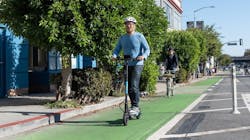Powered scooter share program evolves beyond pilot phase
The San Francisco Municipal Transportation Agency (SFMTA) is creating a permanent scooter share program after a successful pilot program that’s ending this fall.
The Powered Scooter Share Permit Program was introduced July 31 and the application has been released. The program aligns with the city’s goal to provide numerous reliable transportation choices to move in San Francisco. Examples include the city’s current shared mobility options such as bikeshare, moped share and carshare.
The newly adopted Powered Scooter Share Permit Program incorporates lessons learned from the 12-month Powered Scooter Share Pilot as well as the city’s 18-month Stationless Bikeshare Permit Program to create a more useful, safe and equitable citywide program. The application is also accompanied by a series of supporting documents which seek to establish stronger guidance and clearer requirements around key issues such as the distribution of devices, operational sustainability, community engagement processes and data sharing and accountability standards.
The SFMTA expects to issue a limited number of new scooter permits to applicants that meet San Francisco’s high standards for safety, equity and accountability. The city anticipates issuing permits in early fall 2019 so there is no gap in service when the current permits—currently held by operators Scoot and Skip—expire on October 14.
Permits will be effective for no longer than approximately one year, reflecting the rapid pace at which the scooter industry continues to evolve. The director of transportation will establish a cap on the number of authorized scooters – anticipated to be between 1,000 and 2,500 scooters per permittee. As of July, 2019, Scoot and Skip are authorized to operate up to 625 and 800 scooters respectively, although actual deployment varies.
Guiding scooter share to serve the public interest
Powered Scooter Share services have the potential to become a useful component of the transportation system. In May of 2019, the pilot program reached a total average of over 3,400 trips per day. While trips have grown since the pilot initially launched, scooter parking citations and related 311 complaints to the city have dropped. The Mid-Pilot Evaluation also suggests scooter trips may replace trips made by Uber and Lyft and facilitate more transit trips, which would make them an effective choice for the “last-mile” of a journey.
The new application builds on the existing pilot, introducing additional high standards and requirements to obtain a permit, including, among other things:
• Integrating locking mechanisms into all deployed scooters to reduce sidewalk blocking and clutter;
• Conducting a more robust community engagement process (including actively promoting low-income membership plans);
• Requiring stricter rider accountability measures to address safety concerns like sidewalk riding; and
• Piloting adaptive scooters to expand access to people with disabilities.
These changes reflect the priorities and concerns that were raised during the community discussion hosted by SFMTA earlier this spring. SFMTA staff will continue to monitor and evaluate the impact of powered scooter share operations and hold permittees accountable to their commitments.
